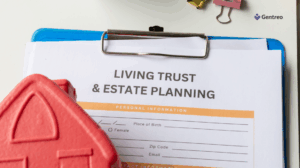
Are you wondering if estate planning is something you should be doing in your 20s? While it may seem premature to think about creating a will and establishing a trust at this stage of your life, it’s actually a smart move that can provide peace of mind and help protect your assets in the long run.
Estate planning is not just for the elderly or those with substantial wealth. It’s about ensuring your wishes are carried out and your loved ones are taken care of, should anything unexpected happen to you. By creating a comprehensive estate plan, you can specify who will inherit your assets, assign someone to make medical decisions on your behalf, and even plan for the care of any dependents you may have. Plus, you can help save the people you love time and money by helping them avoid large legal fees to close your estate.
The Importance of Estate Planning
Estate planning is a crucial step that most everyone should take, regardless of age or financial status. Many people mistakenly believe that estate planning is only necessary for the wealthy or the elderly, but that couldn’t be further from the truth. In reality, estate planning is about protecting your assets and ensuring that your wishes are respected, no matter what happens.
Without a proper estate plan, your assets may be subject to probate, a costly and time-consuming legal process that can tie up your estate for months or even years. Additionally, without a will or trust in place, the distribution of your assets may be determined by the laws of intestacy (the state set rules for how a person’s estate is divided if one dies without a will), which may not align with your wishes.
By taking the time to create an estate plan, you can have peace of mind knowing that your assets will be distributed according to your wishes, and your loved ones will be taken care of. Estate planning also allows you to make important decisions regarding your healthcare and end-of-life wishes, ensuring that your voice is heard even if you are unable to communicate.
What is Estate Planning?
Estate planning is the process of creating a comprehensive plan for the management and distribution of your assets in the event of your death or incapacity. It involves the creation of legal documents, such as a will, trust, power of attorney, and healthcare proxy, which outline your wishes and provide instructions for your loved ones and appointed representatives.
While estate planning can be complex, especially for individuals with significant assets or complex family situations, it is usually essential for everyone to have at least a basic plan in place. Even if you’re in your 20s and don’t have substantial wealth, estate planning can still provide valuable benefits and protections.
Common Misconceptions about Estate Planning
There are several common misconceptions about estate planning that may discourage young adults from considering it. One misconception is that estate planning is only for the wealthy. However, estate planning is not just about distributing assets; it also involves making important decisions about healthcare and end-of-life wishes. Regardless of your financial status, estate planning can ensure that your wishes are carried out and your loved ones are taken care of.
Another misconception is that estate planning is only necessary for older individuals. While it’s true that estate planning becomes more critical as you age and accumulate assets, accidents and unexpected events can happen at any age. By having an estate plan in place, you can help ensure that your wishes are respected and your loved ones are protected, no matter what happens.
The Benefits of Having an Estate Plan
As we’ve discussed, there are numerous benefits to having an estate plan, even if you’re in your 20s. First, an estate plan allows you to specify who will inherit your assets. Without a will or trust, your assets may be distributed according to the laws of intestacy, which may not align with your wishes. By creating an estate plan, you can ensure that your assets are distributed to your chosen beneficiaries.
Second, estate planning allows you to assign someone to make medical decisions on your behalf if you become incapacitated. By creating a healthcare directive and naming a healthcare proxy, you can ensure that your wishes regarding medical treatment are known and respected.
Additionally, if you have dependents, estate planning allows you to plan for their care. By naming a guardian in your will, you can ensure that your children or other dependents are cared for by someone you trust.
When Should You Start Estate Planning?
It’s never too early to start estate planning. While it may seem unnecessary in your 20s, accidents and unexpected events can happen at any time. By starting early, you can take advantage of various strategies that can minimize taxes and maximize the value of your estate.
Moreover, as your life circumstances change, it’s important to update and review your estate plan. Major life events such as marriage, divorce, the birth of a child, or the acquisition of significant assets can necessitate changes to your estate plan. By regularly reviewing your plan, you can ensure that it remains up to date and reflects your current wishes.
Essential Documents in an Estate Plan
An estate plan typically consists of several essential documents. The most basic document is a will, which outlines how your assets should be distributed after your death. A will also allows you to name an executor, the person responsible for carrying out your wishes, and a guardian for any minor children or dependents.
In addition to a will, many individuals choose to create a trust as part of their estate plan. A trust allows you to transfer assets to a separate legal entity, which can provide numerous benefits, such as avoiding probate and maintaining privacy. A trust can also provide for the ongoing management and distribution of assets for the benefit of your chosen beneficiaries.
Other important documents in an estate plan include a power of attorney and a healthcare directive. A power of attorney allows you to appoint someone to manage your financial affairs if you become incapacitated, while a healthcare directive allows you to specify your wishes regarding medical treatment and appoint a healthcare proxy to make decisions on your behalf.
Choosing an Executor and Guardian
Choosing the right executor and guardian is a crucial part of estate planning. An executor is responsible for managing your estate, including things like paying off debts, distributing assets to beneficiaries, and handling any legal proceedings. It’s important to choose someone who is trustworthy, organized, and capable of carrying out your wishes.
Similarly, if you have minor children or dependents, it’s important to choose a guardian who will provide the necessary care and support. Consider factors such as the guardian’s relationship with your children, their values and beliefs, and their ability to handle the responsibilities of guardianship.
Estate Planning for Business Owners
If you’re a business owner, estate planning takes on added complexity. In addition to planning for the distribution of personal assets, you’ll also need to consider the future of your business. This may involve creating a succession plan, identifying a successor or ensuring that key employees are taken care of.
Updating and Reviewing Your Estate Plan
Once you’ve created an estate plan, it’s important to regularly review and update it as needed. Major life events such as marriage, divorce, the birth of a child, or the acquisition of significant assets can necessitate changes to your plan. Additionally, changes in tax laws or estate planning strategies may also warrant updates to your plan.
It’s a good idea to review your estate plan at least every few years or whenever there are significant changes in your life circumstances. By doing so, you can ensure that your plan remains up to date and reflects your current wishes.
Why Estate Planning is Necessary for Everyone
Estate planning is a crucial step that most every adult should take, regardless of age or financial status. It’s about more than just distributing assets; it’s about ensuring that your wishes are carried out and your loved ones are taken care of. By starting early, you can create a comprehensive plan that provides peace of mind and protects your assets in the long run.
Don’t overlook the importance of estate planning, even if you’re in your 20s. Take control of your future and ensure that your wishes are respected. Start the process today and rest easy knowing that you’ve taken the necessary steps to protect yourself and your loved ones.
Don’t wait until it’s too late; start your estate planning journey with Gentreo today. By doing so, you’ll not only protect your loved ones but also gain the peace of mind that comes with knowing your legacy is secure. Click here to join now https://private.gentreo.com/auth/register.
*Disclaimer: This article is for informational purposes only and should not be considered legal advice. Consult with a qualified attorney or estate planning professional for personalized guidance.*







